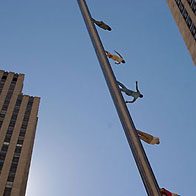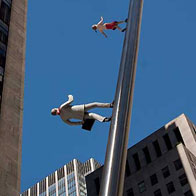Saturday, September 25, 2004
Steve Friedl: An Illustrated Guide to Cryptographic Hashes
Now that's geeky.
Friday, September 24, 2004
Thursday, September 23, 2004
"Hi. This is Dave Winer. We're listening to President GW Bush having a news conference at the Rose Garden of the White House. He's lying like a motherfucker..."
Question -- during the press conference, President Bush said that the "Afghan National Army went into Najaf." Did he mean the Iraqi Security Forces? Can the president not keep his wars straight?
How to Write Software Requirements that Suck
- Put too much in one document; ignore the audience; assume that one document will serve all purposes and completely specify the system.
- Don't establish a shared vocabulary used by clients and development team.
- Don't separate functional and non-functional requirements.
- Don't involve a designer or tech lead in the writing of the requirements.
- Don't use precise, consistent language.
- Don't separate workflow, rules, and business context.
- Focus entirely on how to get data into the system; don't consider where it goes, or how to get it back out.
- Focus on how to solve a problem, rather than what needs to be solved.
- Don't understand how to convert / migrate data from the old system.
- Don't create a concise summary, mission statement, or statement of work.
- Have the wrong people review the document; assume that one person from the client department has perfect understanding of all aspects of the new system.
- Declare victory once the first draft is done; don't plan for iterations or changes.
- Don't pay any attention to secondary clients or systems.
- Organize the information poorly; let rule definitions and data mingle and repeat themselves.
- Don't institute any change management procedures; allow anyone to change the requirements at any time and don't notify anyone when they do change.
- Assume that once the clients approve the requirements they won't change their mind.
- Don't break the requirements down into versions or releases.
- Don't prioritize the requirements; if you do prioritize, use some wacky scheme like priorities from 1 to 100.
- Don't provide the client any tools to visualize the end result; rely entirely on words to describe the requirements.
- Assume that everyone is comfortable reading enormous, really dense documents.
- Don't number the paragraphs.
- Focus entirely on the system's data, how it is structured; ignore workflow.
- Assume that you can write the document entirely based on interviews; don't bother to shadow the clients while they actually do the work.
Via Wonkette: Unfortunate Kerry Photo Ops.
Wednesday, September 22, 2004
Marc Canter's father passed away. So sorry to hear that, and I hope you're dealing with it, Marc.
Because we all like a Tom DeLay / sleazy politician story, here is another.
- Bacardi USA contributes $20,000 to DeLay's Texans for a Republican Majority, a political action committee in Texas (already under investigation).
- DeLay introduces trademark legislation that would give the liquor company exclusive rights to the "Havana Club" rum trademark in the United States. This would effectively end a trademark dispute in which Bacardi USA is involved.
- DeLay planned to slip an amendment revising these U.S. trade statutes on behalf of Bacardi USA into the annual defense authorization bill. So anyone who voted against this abhorrent, unethical amendment will be accused of "not supporting the troops."
Bacardi USA, by the way, is owned by a Bermuda-based company run by a family of prominent Cuban exiles. These Cuban exiles happen to be very generous with campaign donations.
In other DeLay news, a texas grand jury returned felony indictments on charges of making illegal contributions on behalf of DeLay against The Alliance for Quality Nursing Home Care Corp.; Diversified Collections Services Inc.; Questerra Corp.; Cracker Barrel Old Country Store Inc.; Sears Roebuck & Co.; Westar Energy Inc.; The Williams Companies Inc.; and Bacardi U.S.A. Inc.
Remember, Tom DeLay is quoted as saying that he would "stand up for a Biblical worldview in everything I do and everywhere I am."
I don't remember the Bible advocating anything like this.
"If you fly out of Logan Airport and don't want to take off your shoes for the security screeners and get your bags opened up, pay attention. The US government is testing its "Trusted Traveler" program, and Logan is the fourth test airport. Currently, only American Airlines frequent fliers are eligible, but if all goes well the program will be opened up to more people and more airports."
Bruce Schneier is criticizing the "Trusted Traveler" program currently being testing by some airlines. Mr. Schneier mentions Boston Logan airport; I believe it is also being tested at New York's JFK.
He claims that terrorists will slip into the program, then will be able to board airliners with less scrutiny. Normally, I find Mr. Schneier interesting and on-the-money, but I have to disagree with him on this point.
In practice, these programs have proven to be effective. El Al has had a similar program in place for some time, and it is difficult to argue with their 100% safety record. I believe that a Dutch airline has a similar program of background checks plus on the spot biometric checks.
He also seems to confuse two issues:
"Sometimes the results are bizarre. Screeners have searched children and people in wheelchairs. In 2002, Al Gore was randomly stopped and searched twice in one week. And last week Senator Edward Kennedy told about being flagged and denied boarding because the computer decided he was on some "no fly" list."
This is a uniquely American problem. Screeners in the U.S., as is the Transportation Security Agency, are afraid of being accused of "racial profiling." So, rather than inspections based on some kind of pattern or specific intelligence, U.S. screeners practice random inspections. random inspections cause things like the harassment of Senator Kennedy and Vice President Gore [this is true], while allowing Richard Reid on the plane. Note that El Al flagged Reid as a risk, strip searched him, and questioned him for several hours before denying him access to a flight [this is also true].
BBC News: Cult film-maker Russ Meyer dies
Three aides who helped run a political action committee created by the House majority leader, Representative Tom DeLay of Texas, were indicted by a grand jury in Texas on Tuesday on charges that included raising illegal corporate contributions and funneling them to state candidates during the 2002 elections.
[via The New York Times]
The Shifted Librarian has a story from Leland Johnson, who has put together some PERL to allow AIM bots to search library catalogues. So now you can find that book by sending an instant message. Cool.
"There are estimated to be some 25,000 guerrillas in Iraq engaged in concerted acts of violence. What if there were private armies totalling 275,000 men, armed with machine guns, assault rifles (legal again!), rocket-propelled grenades, and mortar launchers, hiding out in dangerous urban areas of cities all over the country? What if they completely controlled Seattle, Portland, San Francisco, Salt Lake City, Las Vegas, Denver and Omaha, such that local police and Federal troops could not go into those cities?" [via Informed Comment]
How are things in Iraq? It is interesting to see how we'd feel about Iraq if the same things were happening in the U.S.
KABUL, Afghanistan (AP) -- An American soldier was killed in an attack on a patrol in eastern Afghanistan, the U.S. military said Wednesday, the third U.S. service member to die in the country this week.
[via The New York Times]
Because of our administration's mainia for war in Iraq, we are losing control of Afghanistan, a place where military intervention was actually justified. The stagnant conditions have led local warlords to begin cooperating with the ousted Taliban; this is a bad thing.
Tuesday, September 21, 2004
On a lark, I bought the DVD War Photographer, a documentary about James Nachtwey. Wow -- really fascinating.
The filmmakers followed Nachtwey as he shot in Kosovo, Jakarta, and the West Bank, capturing him as he recorded scenes of war. The filmmakers added a twist: a small video camera mounted on Nachtwey's camera, so that you can see him framing shots, almost from the perspective of his viewfinder.
Some of the scenes captured by this miniature video camera are gut wrenching, others terrifying. The film is as close as most of us will ever get to Kosovo or the West Bank.
Interviews with Nachtwey and his colleagues are interspersed with the war footage, giving a sense of the man from his perspective, as well as from his friends and other journalists. A really excellent film; highly recommended.
It's Ayad Allawi week. President Bush, starting with his address at the U.N. today, will try to present Mr. Allawi - a former Baathist who the BBC reports was chosen as prime minister because he was "equally mistrusted by everyone" - as the leader of a sovereign nation on the path to democracy. If the media play along, Mr. Bush may be able to keep the Iraq disaster under wraps for a few more weeks.
It may well work. In June, when the United States formally transferred sovereignty to Mr. Allawi's government, the media acted as if this empty gesture marked the end of the war. Even though American casualties continued to rise, stories about Iraq dropped off the evening news and the front pages. This gave the public the impression that things were improving and helped Mr. Bush recover in the polls.
Now Mr. Bush hopes that by pretending that Mr. Allawi is a real leader of a real government, he can conceal the fact that he has led America into a major strategic defeat.
That's a stark statement, but it's a view shared by almost all independent military and intelligence experts.
Paul Krugman in The New York Times.
There is a story out there, and no one is reporting on it. Law enforcement all across the country have diverted a great deal of effort and personnel to counter-terrorism and homeland security. These resources have been diverted from tracking other highly-organized criminal organizations, such as drug trafficking and gangs. As a result, drugs are flowing into the U.S. more freely than any time in recent history. Cocaine is so inexpensive that fewer people take the trouble to refine it out to crack. Whatever your position on illegal drugs, this is an interesting story.
And no one is talking about it.
Monday, September 20, 2004
This is sick.
- Kingston has 2-and 4- gigabyte compact flash cards in their "Elite Pro" line for $220 and $500.
- Today at work, we had a conversation about a 700 megabyte server filesystem that had filled up.
One of these things is really cool, and one is fucking asinine and about a decade behind the times. I'll leave it as an exercise to the reader to figure out which is which.
Cromogenic.net: Never take pictures of sunsets or the Eiffel Tower.
Sage advice from Justin Ouellette! To that I'd add...
New York photographers: never take pictures of the Empire State Building or the Brooklyn Bridge. Or the Flatiron. Or that God damn bridge in Central Park. Or cats. Cat photos == death.
POTD
Funky public art project in Rockefeller Center.
It is by Jonathan Borofsky, called "Walking to the Sky". Looks to be an elaboration of his "Man Walking to the Sky."
My earlier post was cut short due to an impending meeting. In case you aren't registered to vote, you still have time, and it is quite easy. I changed my address information in about 10 minutes earlier this month.
Head over to JustVote.org and fill out a form.
I'm not a joiner. As soon as someone forms some kind of affiliation or group, I'm immediately trying to distance myself from "those people." I don't like being part of any kind of mob.
That being said...
I'll be there. Event though I'm not really a "photoblogger."
If you want to see what a real-live hermit looks like, head down to SoHo on the 30th. I'll be the uncomfortable-looking one in the back.
If you aren't registered to vote, time is running out.
Sunday, September 19, 2004
"Once upon a time, the PC was pitted against the mainframe in the tussle between freedom and control. Now it's PC versus PC. In this sound clip (1 min 15 secs, mp3) from yesterday's conversation with Ray Ozzie, we hear about an employee with two side-by-side laptops. He does all his work on the home PC, because it has the productivity tools he needs. Then he transfers the results to his locked-down work PC by way of a USB thumbdrive."
Ha! I guess I'm not the only one who does this.
Corporate IT departments follow the Peter Principle, where employees rise their level of incompetence. People are promoted until they suck so much they can't possibly be promoted any more. They stay stuck in a job for which they are neither qualified nor capable.
The company ends up with desktop support and security people who can't support or secure the computer systems, out of incompetence or laziness. They enact asinine policies. They create systems that are not suitable for serving their clients' needs. They create policies and procedures to overcome their personal failings.
So the smart people, those who are able to do their jobs, continue trying to get work done, or they just give up. The smart, capable people work around these bureaucratic impediments. Or they quit, looking for environments that aren't collapsing under their own weight.











